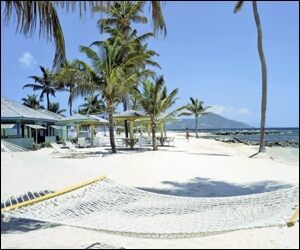
Nisbet Plantation Beach Club
Basseterre, St. Kitts – Nevis
January 26, 2016 (SKNIS)
The tourism industry in the Caribbean and in particular St. Kitts and Nevis has led to a significant increase in the Gross Domestic Product (GDP), said Carlene Henry-Morton, Permanent Secretary in the Ministry of Tourism, citing statistics taken from the Caribbean’s tourism development agency.
“According to the Caribbean Tourism Organization (CTO), last year the Caribbean welcomed 26.3 million tourists who contributed a record US$29.2 billion to our economies,” said the permanent secretary, while adding that a number of these tourists visited the shores of the twin-island Federation. “For the 2015-2016 cruise season so far, St. Kitts and Nevis has welcomed 350,000 visitors and we are on course to welcome our one millionth visitor by the end of this cruise season in June.”
Henry-Morton reflected on the many developments that are presently taking place and noted that they will attract more stay-over visitors. The developments include the Park Hyatt Hotel which will open in October 2016, the 250 room Embassy Suite Hilton Hotel, which is due to come on stream in 2017, the luxury 324 room Koi Resort and Residences, the Imperial Residences project, which comprises of 86 one bedroom condominium units and the construction of the 216 condominium unit property known as Pirate’s Nest.
“These are all high-end luxury brands with the potential to attract very affluent and discerning travelers, but we have to note with equally high levels of expectations of the destination that they visit,” she stated. “As a people, we must come to fully appreciate that tourism is a service-driven industry and the onus is therefore on us to add those final touches that complete, enhance and add value to the visitor experience.”
The permanent secretary said that it is critical to understand that although important, responsible and sustainable tourism is not only about large hotels, resorts and wealthy guests. She explained that tourism is primarily about people and the industry offers immense opportunities for locals to improve their quality of life either through direct employment or indirectly through the ancillary services provided by the tourism sector.
“Investment in the development of our physical infrastructure must occur in tandem then with the investments in development of our most important resource, our people,” said Henry-Morton. “At the Ministry of Tourism, we have embarked on a decidedly people-centered approach to tourism sector development with an emphasis on service training and education.”
She noted that this strategic approach emphasizes community outreach, paying particular attention to grass root leadership and it also targets local learning institutions.